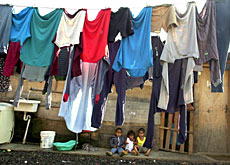
NGOs slam IMF and World Bank for failing the poor

Swiss non-governmental organisations (NGOs) say not enough is being done by the Bretton Woods institutions to address the needs of developing countries.
The criticism comes as the International Monetary Fund (IMF) and the World Bank celebrate their 60th anniversary at a spring meeting in Washington.
Jean-Claude Huot, permanent secretary at Swiss NGO the Berne Declaration, says the institutions are not sensitive enough to the needs of developing countries.
“The main problem is that these two institutions promised a lot: fighting poverty, good governance, etc. But they are not democratic at all and are therefore not doing their job properly,” Huot told swissinfo.
In particular, Huot says, their focus on debt repayments does not help to alleviate poverty, and can actually harm the economic prospects of many developing nations.
But Switzerland, which has been a member of the institutions for over ten years, says they are fulfilling their mandates to help poorer countries.
“The IMF is not a development agency. Its principal role is to help countries conduct sound macroeconomic policies,” said Friederike Pohlenz, spokeswoman for the Swiss delegation to the IMF.
“This is indispensable for allowing them to maximise the opportunities and minimise the risks of globalisation,” she added.
Selecting directors
The NGO says the lack of transparency at the World Bank and IMF is most apparent in the selection of directors for the institutions, a choice which is made behind closed doors.
The post at the IMF has traditionally always gone to a European and the World Bank director has always been an American.
The Berne Declaration says it is time to make the selection process transparent and to open the top jobs to candidates from developing countries.
“In 2000, there were discussions over the selection of directors [and] it was decided that the process must be reviewed and that the director must be elected in future,” said Huot. “But nothing has changed.”
Pohlenz agrees that change is needed, and insists that Switzerland has been pushing for the selection process to be made more transparent – a request that was repeated at the IMF meeting on Saturday.
The Berne Declaration is calling on Switzerland to take a firm line and push for the election of directors who are more in touch with the needs of developing countries.
The NGO accuses Switzerland of being too afraid to stick its neck out on this issue – a charge the Swiss delegation to the IMF rejects.
Transparency
“During its more than ten years of membership, Switzerland has pressed for a number of changes, especially in the area of transparency, where we have successfully pushed for the publication of country and policy reports,” said Pohlenz.
Despite its concerns, the Berne Declaration says Switzerland’s membership of the Bretton Woods institutions has allowed it to make its voice heard.
“From our point of view it was important for Switzerland to be a member. Because we can now participate in decisions,” Huot said.
“We NGOs are in contact with the Swiss members of the board, we can get our opinions heard and open discussions on matters such as debt reduction with big multinationals.”
Huot added that Switzerland had brought useful experience to the institutions.
“In the World Bank, at least, it has been possible to bring Switzerland’s experience in development policy to the table.”
swissinfo, Joanne Shields
The Bretton Woods institutions consist of the International Monetary Fund and the World Bank.
They were set up at Bretton Woods in the United States in 1944 in a bid to prevent a repetition of the economic policies which led to the Great Depression of the 1930s.
The institutions have 184 member countries.
Switzerland joined the Bretton Woods institutions in 1992.
It represents Poland, Serbia and Montenegro, Azerbaijan and four Central Asian countries at the IMF.
The spring meetings take place on April 24 to 25 in Washington.

In compliance with the JTI standards
More: SWI swissinfo.ch certified by the Journalism Trust Initiative


























You can find an overview of ongoing debates with our journalists here . Please join us!
If you want to start a conversation about a topic raised in this article or want to report factual errors, email us at english@swissinfo.ch.